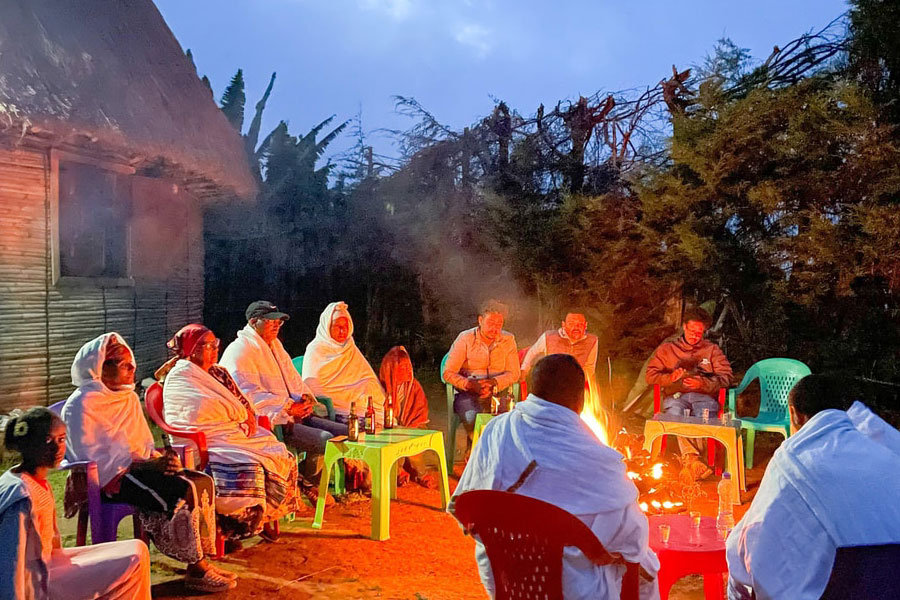
Fortune News | Mar 28,2020
Ethiopian immigration authorities announced the resumption of electronic and on-arrival visas last week, marking the end of a suspension for all travellers that began in mid-June 2021.
The announcement comes as good news to businesses involved in the hospitality industry, which had been hit hard by the COVID-19 pandemic and expressed their misgivings about the suspension. Starting on June 18, all travellers were required to apply for visas at Ethiopia's embassies or consulates, many of which are now closing.
Officials at the Immigration, Nationality & Vital Events Agency attributed construction works and internal system updates as the reason behind the suspension of electronic visas.
The reforms also comprised hiring staffing, training employees, and upgrading the system to reduce fraud and improve response rates, according to Desalegn Teresa, director of communications at the Agency. The Agency recruited around 60 staff to facilitate online visa processing.
"Reenforcing our firewall against cyber-attack was also part of it," he added.
The electronic visa programme was launched by the former Department for Immigration & Nationality Affairs, restructured under an agency, in 2017. The visa application process can take up to three days. Once approved, the e-visa is sent to the applicant through email.
All foreign but Djibouti nationals seeking to enter Ethiopia must hold a visa except passengers arriving at Addis Abeba Bole International Airport for connecting flights, who are exempt if they do not leave the airport. Travellers from African Union member countries have been eligible for visas on arrival since 2018; a decision followed after officials, including Prime Minister Abiy Ahmed (PhD), pledged to lift visa restrictions to attract foreign investments and encourage businesses involved in the hospitality sector.
The Agency charges 52 dollars to process an e-visa and 70 dollars if the applicant is a US citizen. The Agency had generated over 10 million dollars last year, issuing more than 200,000 visas, the majority of which were electronic.
Three days after the resumption of the service, 676 visa-on-arrival requests have been granted out of a total of 1,405 applications, signalling hope for the hospitality industry, which is preparing for tourist peak season, running from September to April.
Hotels in the capital, which had reported monthly revenue losses of 35 million dollars eight weeks after the first case of COVID-19 was reported in March 2020, are especially pleased.
"The resumption of on-arrival visas is good news for hoteliers and tour operators and comes as the peak season approaches," Biniyam Bisrat, CEO of Jupiter Hotel and chairperson of Addis Abeba Hotel Owners' Association, told Fortune.
The Association represents 176 star-rated hotels in the capital with over 11,600 rooms. Biniam believes the suspension of visa-on-arrival services undermined the recovery of the hospitality industry.
However, the recommencement of on-arrival visas does not seem to be enough for tour operators like Mulugeta Alemnew, manager of Click Tour & Travel Agency.
"It may enhance conference and business tourism, but the instability in the north still undermines the leisure tourism segment," said Mulugeta.
Business travellers account for over 90pc of tourism in Addis Abeba.
Over the past decade, the tourism industry had shown encouraging growth. In 2019, tourist arrivals to Ethiopia registered at 812,000, a big leap from a decade earlier, showing an annual growth rate of a little over 10pc. Following the COVID-19 pandemic last year, tourist arrivals to Ethiopia dropped by a staggering 69pc, according to a study conducted by the UNCTAD.
The civil war raging in Tigray Regional State and large parts of Amhara and Afar regional states is likely to exacerbate the issue, as conflict has discouraged travel to popular destinations such as Axum, Lake Tana, the Danakil Depression and Lalibela.
PUBLISHED ON
Sep 04,2021 [ VOL
22 , NO
1114]

Fortune News | Mar 28,2020

Agenda | Sep 28,2024

Fortune News | Jul 02,2022

News Analysis | Dec 15,2024

Radar | Jun 25,2022

Dec 22 , 2024 . By TIZITA SHEWAFERAW
Charged with transforming colossal state-owned enterprises into modern and competitiv...

Aug 18 , 2024 . By AKSAH ITALO
Although predictable Yonas Zerihun's job in the ride-hailing service is not immune to...

Jul 28 , 2024 . By TIZITA SHEWAFERAW
Unhabitual, perhaps too many, Samuel Gebreyohannes, 38, used to occasionally enjoy a couple of beers at breakfast. However, he recently swit...

Jul 13 , 2024 . By AKSAH ITALO
Investors who rely on tractors, trucks, and field vehicles for commuting, transporting commodities, and f...

Oct 25 , 2025
The regulatory machinery is on overdrive. In only two years, no fewer than 35 new pro...

Oct 18 , 2025
The political establishment, notably the ruling party and its top brass, has become p...

Oct 11 , 2025
Ladislas Farago, a roving Associated Press (AP) correspondent, arrived in Ethiopia in...

Oct 4 , 2025
Eyob Tekalegn (PhD) had been in the Governor's chair for only weeks when, on Septembe...